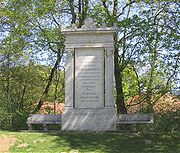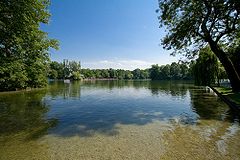
Reinhard von Werneck
Encyclopedia

Freiherr
The German titles Freiherr and Freifrau and Freiin are titles of nobility, used preceding a person's given name or, after 1919, before the surname...
von Werneck (28 June 1757 – 27 July 1842) was the successor of Benjamin Thompson
Benjamin Thompson
Sir Benjamin Thompson, Count Rumford , FRS was an American-born British physicist and inventor whose challenges to established physical theory were part of the 19th century revolution in thermodynamics. He also served as a Lieutenant-Colonel in the Loyalist forces in America during the American...
in the management of the English Garden in Munich
Munich
Munich The city's motto is "" . Before 2006, it was "Weltstadt mit Herz" . Its native name, , is derived from the Old High German Munichen, meaning "by the monks' place". The city's name derives from the monks of the Benedictine order who founded the city; hence the monk depicted on the city's coat...
. During the six years that he held this office he was responsible for the creation of the Kleinhesseloher See and the addition of the Hirschau to the garden.
Life
He was born in LudwigsburgLudwigsburg
Ludwigsburg is a city in Baden-Württemberg, Germany, about north of Stuttgart city centre, near the river Neckar. It is the largest and primary city of the Ludwigsburg urban district with about 87,000 inhabitants...
, the son of Franz Friedrich Freiherr von Werneck
Franz von Werneck
Franz Freiherr von Werneck, born 13 October 1748 – died 17 January 1806, enlisted in the army of Habsburg Austria and fought in the Austro-Turkish War, the French Revolutionary Wars, and the Napoleonic Wars. He enjoyed a distinguished career until 1797, when he lost a battle and was dismissed...
and his wife Marianne Dorothea, born von Mentzingen. He served briefly in the Austrian army, then turned to farming, before joining the Bavaria
Bavaria
Bavaria, formally the Free State of Bavaria is a state of Germany, located in the southeast of Germany. With an area of , it is the largest state by area, forming almost 20% of the total land area of Germany...
n army as a colonel (Oberst) in the infantry in 1797. In November 1798, he was given the direction of the English Garden "to fill out his free hours" ("zur Ausfüllung seiner Mußestunden"); and this responsibility was made his main duty in March 1799, with the guidance of Friedrich Ludwig von Sckell
Friedrich Ludwig von Sckell
Friedrich Ludwig von Sckell was a German landscape gardener from Weilburg an der Lahn.Sckell was trained in the Court Market Garden in Schwetzingen near Mannheim and worked after his apprenticeship in Bruchsal, Paris, and Versailles. From 1773 to 1777, he was in England busying himself with...
, who had general responsibility for garden construction in Bavaria and Rheinland Pfalz. At his own cost Werneck travelled to Bohemia
Bohemia
Bohemia is a historical region in central Europe, occupying the western two-thirds of the traditional Czech Lands. It is located in the contemporary Czech Republic with its capital in Prague...
and Saxony
Saxony
The Free State of Saxony is a landlocked state of Germany, contingent with Brandenburg, Saxony Anhalt, Thuringia, Bavaria, the Czech Republic and Poland. It is the tenth-largest German state in area, with of Germany's sixteen states....
to prepare himself for his duties. He hoped to make the English Garden self supporting or even profitable by means of farming and mills (a sawmill and a grainmill were built in 1798), almost doubling the area of the garden for the purpose, through the addition of a stretch of ground to the north of the original garden.

The newly acquired ground, the Hirschau, was of low agricultural quality; and Werneck set his soldiers to improving it in 1800 to 1802. These improvements had been expensive; and when Werneck sought money to cover the debts incurred and to buy more livestock for the garden, the request was refused. In order to finance the garden, he was driven to himself buy the concession to the mills, when no other buyer could be found at the price demanded of 5000 florins. In addition, he had made an enemy of Professor Anton Will, director of the veterinary school, which Thompson had created along with the English Garden. Insulting language from Werneck – as, for instance, that he shat on Will's demands – led Will to complain at court. In 1804 Maximilian IV Joseph gave Sckell direct charge of the English Garden and removed Werneck, with assurances of "complete satisfaction" ("allerhöchster Zufriedenheit") with his work. Werneck was disappointed: "I am losing the English Garden, working on which made my life agreeable; I had sought nothing, asked for nothing, and I lose the only thing that gave me pleasure."
As consolation, he was promoted to major general (Generalmajor) and given charge of the corps of cadets, in which children destined to become officers were instructed. He held this post until his retirement on account of ill health in 1817. In 1818 he settled in Schloss Triesdorf in Ansbach
Ansbach
Ansbach, originally Onolzbach, is a town in Bavaria, Germany. It is the capital of the administrative region of Middle Franconia. Ansbach is situated southwest of Nuremberg and north of Munich, on the Fränkische Rezat, a tributary of the Main river. As of 2004, its population was 40,723.Ansbach...
. He survived for many years and was still living in 1838, when Ludwig I
Ludwig I of Bavaria
Ludwig I was a German king of Bavaria from 1825 until the 1848 revolutions in the German states.-Crown prince:...
honoured his contributions to the English Garden with a monument, designed by Leo von Klenze
Leo von Klenze
Leo von Klenze was a German neoclassicist architect, painter and writer...
near the banks of the Kleinhesseloher See. He died on July 27, 1842 at the age of 85 in Tegernsee
Tegernsee
Tegernsee is a town in the Miesbach district of Bavaria, Germany. It is located on the shore of Tegernsee lake, at an elevation of 747 m above sea level....
.
Literature
- Theodor Dombart, Der Englische Garten zu München. Munich: Hornung, 1972. ISBN 3-87364-023-6
- Sabine Heym, "Reinhard Freiherr von Werneck (1757-1842)", 26-29 in P. von Freyberg (ed.) Der Englische Garten in München. München: Knürr, 2000. ISBN 3-928432-29-X

